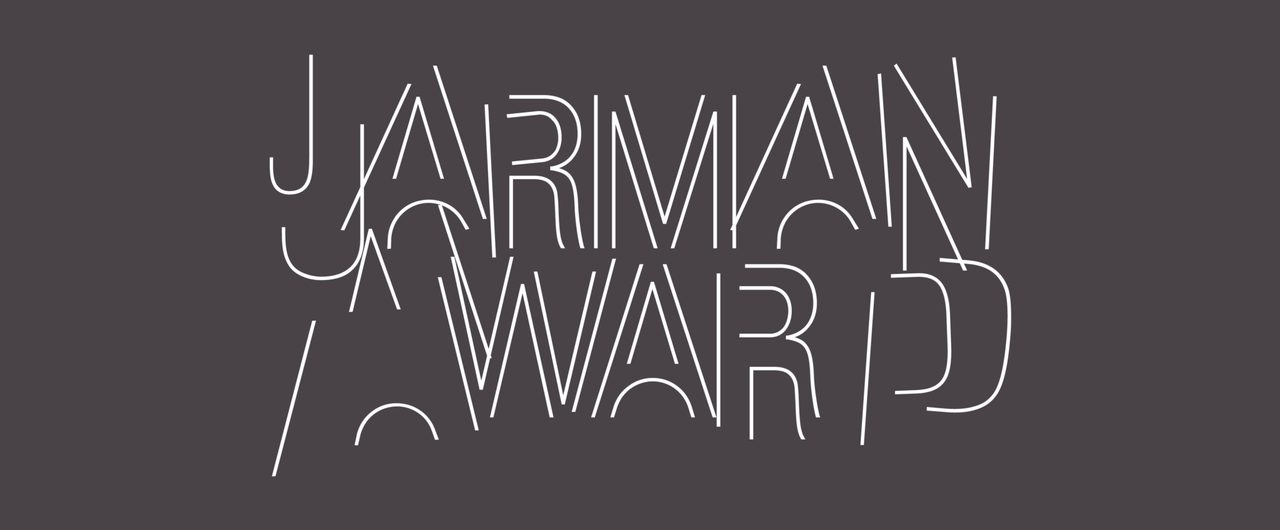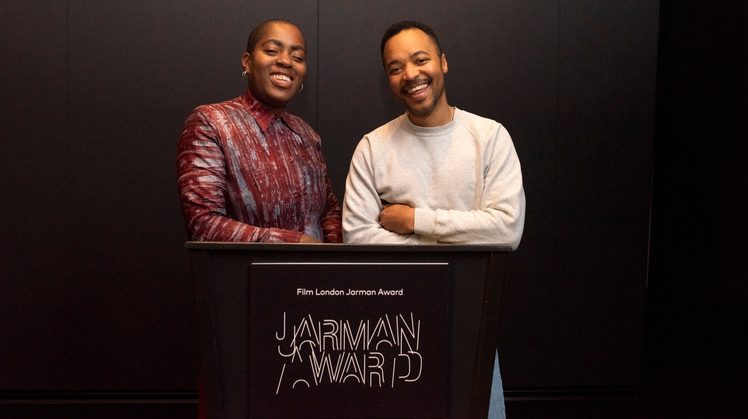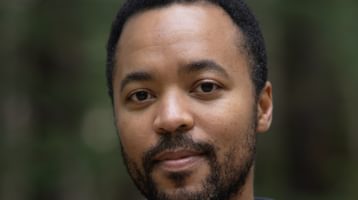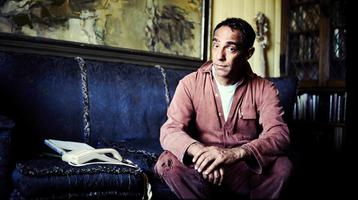
The Film London Jarman Award 2025
The Film London Jarman AwardThe 18th Film London Jarman Award was presented to Onyeka Igwe and Morgan Quaintance.
This is the first year that the award has been shared between two artists who were considered equally deserving of the award, with significant bodies of work at the forefront of artists’ moving image practice.
Harnessing the transportive power of film, work by artists in the Film London Jarman Award 2025 shortlist journey from the inner-city streets of Lagos and London to villages in Italy and Algeria. From a beautifully shot black and white film that conveys the timeless and ongoing search for belonging, to a flickering abstract meditation on the nature of physical labour, the Jarman Award presents some of the most vital and creative approaches to the moving image today.
Throughout Autumn, in the run-up to the event, audiences can explore the work of the shortlisted artists through a nationwide touring programme presented in partnership with a variety of cultural venues, dates to be announced in September. This year, for the first time, the shortlisted artists' work will be presented as an exhibition at the Whitechapel Gallery, London from 18 November – 14 December 2025.
The Film London Jarman Award 2025 shortlist
Recognising an outstanding body of work, the Film London Jarman Award shortlist represents a selection of recent films by mid-career artists nominated from across the UK. The works raise pressing global concerns around labour, migration, environmental degradation and protest whilst continuing Jarman’s legacy of challenging cinematic and artistic conventions.
Artist duo Arwa Aburawa and Turab Shah take a cinematic approach to the ongoing legacies of colonialism and the power of community. Their film And still, it remains(2023) takes us to Mertoutek, a remote village in Southern Algeria’s Hoggar Mountains. Meditative shots of mountains and ancient rock paintings are intercut with quiet scenes from everyday life, as the film uncovers the lasting impact of French nuclear testing that took place nearby in the 1960s.
Often presented within sculptural installations, Karimah Ashadu’s recent film works include Machine Boys (2024), a portrait of the daring and macho world of motorcycle taxi drivers in Lagos. High speed tricks, roaring engines and thick dust result in an explosive film that explores issues of labour and identity, and ultimately reveals a poignant vulnerability that questions Nigeria’s patriarchal culture.
Moving across archival material, digital and analogue film formats, the work of Hope Pearl Strickland considers how relations of care might wrestle with systems of power and control. a river holds a perfect memory (2024) meanders gently across waterways in Jamaica, from a leisurely raft on the Martha Brae River to a night-time boat trip in Falmouth’s bioluminescent Lagoon. Shifting focus to the impact of industry on the waters of northern England, the film uses water to explore the entanglement of these supposedly disparate communities.
George Finlay Ramsay’s poetic works explore ideas of myth and ritual through an artful approach to 16mm analogue filmmaking. Flesh, Wax & Glass (2023-2025) is a trilogy of works that document the culture surrounding a Catholic bloodletting rite unique to Southern Italy. The Age of the Son (2024) sees the son of a Calabrian lorry driver assume his late father’s mantle, leading the Vattenti procession during Holy Week while working through his own grief.
Moving image artist, writer and musician Morgan Quaintance brings together multiple media in an expanded art practice to produce richly layered films with an intense sensory impact.Efforts of Nature(2023) considers the passage of time and processes of change and dissolution from two distant perspectives: the existential level of the body and the planetary level of shifting geological conditions. Blending low resolution footage, 16mm film and satellite imagery, the film moves between nonfiction and kaleidoscopic abstraction.
Onyeka Igwe’s recent works draw on research and archive material to explore complex subjects with an evocative visual style.The Miracle on George Green (2022) presents a picture of the protests and collective resistance to the building of the M11 link road in Hackney. Born out of Igwe’s childhood memories and recurring walks through Hackney Marshes in lockdown, the work expands outward through archival materials to global histories of protest.

The Jury who selected this year’s shortlist are: Matthew Barrington, Cinema Curator, Barbican; Shaminder Nahal, Commissioning Editor, Arts and Topical, Channel 4; Maryam Tafakory, 2024 Jarman Awardee; Gilane Tawadros, Director, Whitechapel Gallery; Nicole Yip, Director, Spike Island and Film London Board Member.
About the Jarman Award
The Film London Jarman Award is a prestigious annual prize which recognises and supports the most innovative UK-based artists working with moving image, and celebrates the spirit of experimentation, imagination and innovation in the work of emerging artist filmmakers. Launched in 2008 and inspired by visionary filmmaker Derek Jarman, the Jarman Award showcases artists' moving image to audiences throughout the UK and beyond through its annual touring programme.
Now in its eighteenth year, the Jarman Award has built an enviable reputation for celebrating the practices of ground-breaking artist filmmakers working in the UK. Previously shortlisted artists include Heather Phillipson,Lawrence Abu Hamdan, Oreet Ashery,Duncan Campbell, Monster Chetwynd, Luke Fowler,Imran Perretta, Charlotte Prodger, Laure Prouvost, Elizabeth Price, James Richards, Sin Wai Kin and Project Art Works all of whom went on to be shortlisted for or to win the Turner Prize.
The Film London Jarman Award is presented by Film London with support from Arts Council England and Whitechapel Gallery.










